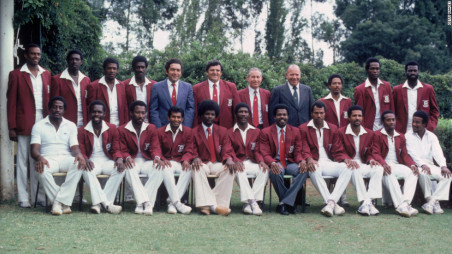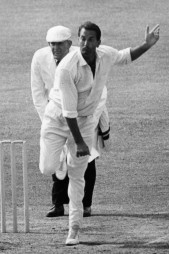The rebel tours: When black cricketers were awarded ‘Honorary White’ status
Each cricketer was offered in the range of US $100,000 to US $120,000 to play one series. That amount of money was unheard of in cricket at that time.

There was a buzz in the air. The media, the officials and the fans waited eagerly at the Johannesburg Airport. This was the day that they are going to welcome the champion cricketers from the West Indies for the first time. In a country deprived of international cricket for more than a decade it was a big opportunity and one the local fans did not want to miss.
The West Indies team that reached Johannesburg with a hero's welcome, was led by Lawrence Rowe, a 33-year-old batsman with a Test triple ton under his belt. His 18 man squad had players like 1979 World Cup final hero Collis King, and fearsome fast-bowlers Collin Croft and Sylvester Clarke.
The team was given VIP treatment all over the country. The hotels, the malls, public events wherever they went, they were treated like royalty. But, to make sure that the West Indian cricketers get an all-access pass to the country, they were presented with 'Honorary Whites' status. In was unprecedented in the history of cricket or any sport.
To understand how it all happened what was going on in South Africa's sport and cricket at that time under the apartheid, a system of institutionalised racial segregation that existed in South Africa from 1948 until the early 1990s, one need to look back at the 1960s and a talented all-rounder named Basil D'Oliveira.
The D'Oliveira affect and South Africa's banishment
Basil D'Oliveira was a 'coloured' South African cricketer who started playing for England from 1966. He left his native country for its apartheid legislation, which barred him from getting into the all-white Test team on racial grounds.

England was scheduled to tour South Africa in 1968, and D'Oliveira was one of the 'thought to be confirmed' members of the squad after his plaudits against Australia earlier that year. But the MCC, which selected the Test sides back then, dropped D'Oliveira from the touring side. After a lot of apprehension and media outburst, he was called to the team again to replace the injured Tom Cartwright. It sparked anger amongst the South African authority especially the then S.A Prime Minister B.J Vorster accused MCC of making a politically motivated selection. The MCC eventually announced the tour's cancellation.
Cancellation or boycotting of sporting events were nothing new in South Africa in the 1960s but the D'Oliveira controversy was the first to have a serious effect on cricket. South African Board of Control of Cricket (SABOC) announced its intention to remove racial barriers in South African cricket in 1969 and formally integrated the sport in 1976.
But, the efforts were of no good use and after the Olympics and Commonwealth games ban of the 1960s, South Africa was banned from participating in any form of international cricket in 1970. The International Cricket Council (ICC) or International Cricket Conference as it was known back then imposed a moratorium on the home and away series to South Africa.
The rebel tours and the West Indies
After the cricketing ban, South Africa delved into their efforts of keeping the sport, which was a favourite amongst "the whites" of the country, alive and popular. They planned for unofficial tours of the teams.
The SABOC started incognito negotiations with players from different countries. There were four private tours organized by British businessman Derrick Robbins, where cricketers would play for the DH Robbins Xi against the SA XI.
In the early 80s, the SABOC focused more on bringing national sides in the country and made the West Indies their primary target. The West Indies were at that time two times world champions and widely considered as the greatest team to have ever played the game. Also, for their aggressive and fearless style of playing made their cricketers very popular in South Africa.
The negotiations went on. As the Caribbean players were not earning as much as the members of the best team in the world should, the SABOC started offering them a large number of appearance fees for the tour. Each cricketer was offered in the range of US $100,000 to US $120,000 to play one series. That amount of money was unheard of in cricket at that time. They even offered the biggest Caribbean superstar Vivian Richards, a blank check to come and play. Still, the West Indian cricketers could not be tempted.
Most of them wanted to play for their national side and knew that one tour of South Africa could jeopardize their whole career. The SABOC, in the meantime, organized two series' against England and Sri Lanka in 1982. The English cricketers who were involved got a three-year ban and the Lankans received banishment of 25 years.
Finally, SABOC managed to convince 18 of the West Indies cricketers to visit their country and play three Tests and six one-dayers. When the cricketers arrived they were granted the "Honorary White" status for their stay in South Africa.

"Honorary whites" was used by the apartheid regime to grant similar rights and privileges of whites to those who would otherwise be treated as non-whites. Usually, East Asians like Japanese, Koreans and Taiwanese were granted this status, and later on other Chinese and individually designated figures of other races were added as well.
In sports, before the West Indian cricketers, the status was awarded to the Maori and Samoan players of the touring New Zealand Rugby team. Tennis legend Arthur Ash was also offered the status but he denied.
But this was the first precedence of black cricketers accepting the status of "Honorary White". With that status, the Caribbean cricketers toured and played all-over a country, where people were facing brutality from an abhorrent regime for having the same skin colour as theirs.
The aftermath
The rebel tours would go on for seven more years till 1990 and a total of seven tours were made by four teams. There were worldwide vexation and protests for all the touring teams but it was the West Indians who got hammered the most.
West Indies Cricket Board (WICB) banned the participating players for life. West Indies toured once again in 1983-84 season, with almost the same squad. Eventually, the WICB lifted the ban after six years in 1989, but by then most of the players have either retired or passed their prime. Some of them continue to play cricket for clubs in England and Australia.
But, outside the field, they were isolated. Shunned by their communities, many of them settled in other countries. For the West Indian people at that time, touring South Africa meant an insult to their race and their African ancestry.
Michael Manley, the then Prime Minister of Jamaica, echoed the sentiment of the people in his book A History of West Indian Cricket.
"To the members of the black diaspora, the oppression which continues unabated in South Africa has become the symbol of more than a tyranny to be overthrown. Apartheid points like a dagger at the throat of black self-worth in every corner occupied by the descendants of Africa", wrote Manley.
The rebel players, however, had their version of the story. The captain of the side that toured South Africa, Rowe stated later that he and several other players were "disillusioned" with the West Indies Cricket Board for not selecting them despite good performances. Some of them like Collis King never regretted the tour even after being deemed as mercenaries.
"I made the decision because I wasn't getting treated right as far as the West Indies (team) was concerned," King told in an interview to CNN years later. "And I said to myself, 'Well, cricket is my job. You're not picking me, I'll go play cricket someplace where people will see proper cricket.' And that's why I went."
Some of them tried to wrap the professionalism cover around the tour. Wicket-keeper batsman David Murray who had to go to Australia for a living after the tour thought they were doing their duty as professional cricketers.
"I don't see the mercenary part of it or whatever. We were just professional cricketers. You've got work to do." Murray Said.
In the end, the team that was branded a rebel remained of the most controversial in the country's sporting history. Whatever might be the reason, the Caribbean people could not accept their heroes trading themselves for money.
"I know that some of them are out of work and the money is very tempting but that is not all in life", the line from the Legendary West Indies Captain Clive Lloyd summed it up.


 Keep updated, follow The Business Standard's Google news channel
Keep updated, follow The Business Standard's Google news channel














